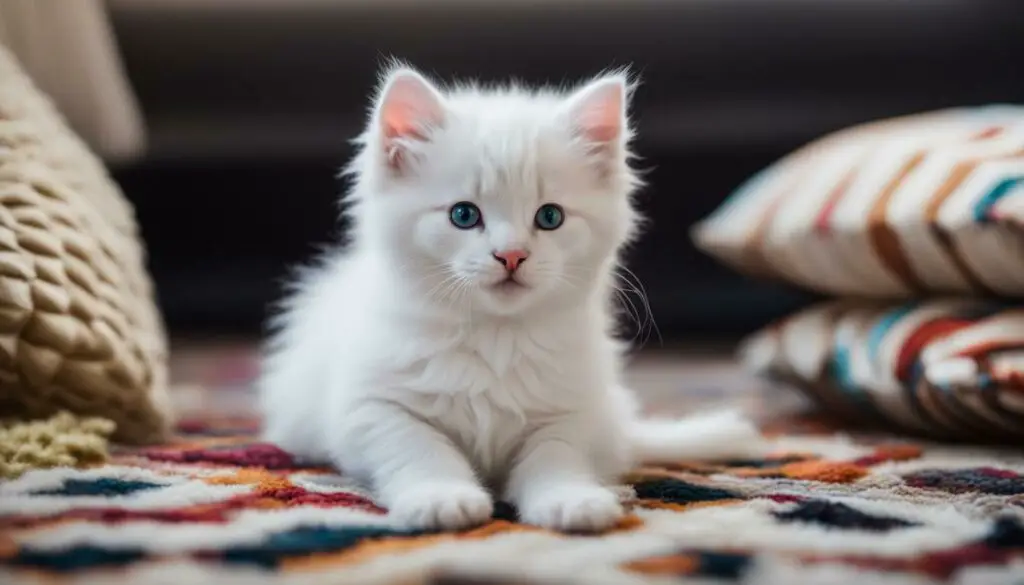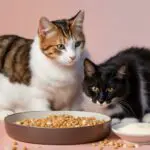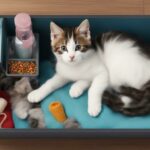If your adorable kitten has been farting a lot, you might be wondering what could be causing this amusing yet concerning behavior.
Key Takeaways:
- Kitten farting can be caused by various factors including dietary issues, intestinal parasites, and intestinal diseases.
- Excessive farting in kittens should be addressed with the guidance of a veterinarian.
- Medication can help eradicate intestinal parasites, while dietary changes may reduce farting.
- Treating intestinal diseases may involve medication, surgery, or special diets.
- Monitoring the kitten’s diet and feeding habits is important to identify potential triggers for farting.
Understanding Kitten Farting
Kitten farting is a normal bodily function, just like in humans, and can be triggered by a variety of factors. While it may seem amusing or even adorable, excessive farting in kittens can sometimes indicate underlying issues that need to be addressed. In this section, we will explore the reasons why kittens fart and why it may be perceived as funny or cute.
One of the primary causes of kitten farting is their diet. Just like humans, kittens can experience flatulence when they consume certain foods that are difficult to digest. It’s essential to pay attention to their diet and ensure they are eating a balanced and high-quality cat food that is suitable for their age and health condition. Avoid giving them human foods that may cause indigestion and gas.
Another factor that can contribute to kitten farting is intestinal parasites. These parasites can disrupt the normal digestive process, leading to increased gas production. Regular veterinary check-ups and preventative measures, such as deworming, can help keep these parasites at bay. If you suspect your kitten may have intestinal parasites, consult your veterinarian for proper diagnosis and treatment.
Additionally, some kittens may suffer from intestinal diseases that can contribute to excessive farting. These diseases can range from mild to severe and may require specialized treatment such as medication, surgery, or a special diet. If your kitten’s farting is persistent and accompanied by other symptoms like diarrhea or vomiting, it’s crucial to seek veterinary help for an accurate diagnosis and appropriate treatment.
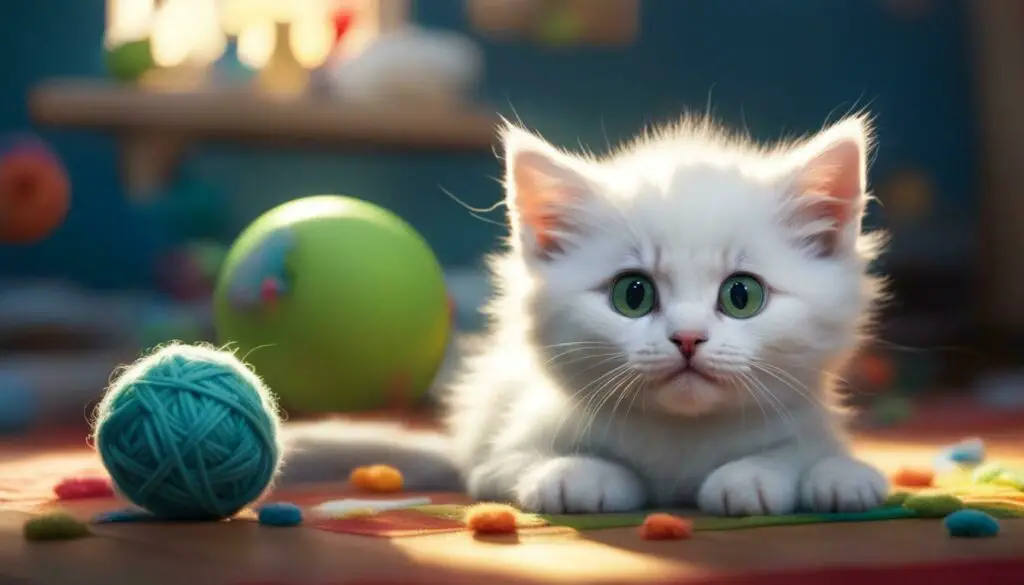
| Causes of Kitten Farting | Solutions |
|---|---|
| Dietary Factors | Ensure a balanced and suitable cat food |
| Intestinal Parasites | Regular veterinary check-ups and deworming |
| Intestinal Diseases | Consult a veterinarian for diagnosis and treatment |
Remember, while kitten farting can be amusing, it’s important to monitor their health and seek professional help if their farting becomes excessive or is accompanied by other symptoms. With proper care, diet, and regular veterinary check-ups, you can ensure your kitten’s digestive system stays healthy and their farting remains at a normal level.
Common Causes of Kitten Farting
Excessive kitten farting can be attributed to various causes, including dietary issues, intestinal parasites, and intestinal diseases. Understanding these causes is essential in addressing this adorable yet smelly problem.
Dietary Issues: A kitten’s diet plays a significant role in their digestive health, and certain foods can contribute to increased flatulence. Foods high in fiber, such as beans, broccoli, and cabbage, can cause gas production in kittens, leading to farting episodes. Additionally, lactose-containing items like milk can be difficult for kittens to digest, causing gastrointestinal distress and more frequent farting. It is important to monitor your kitten’s diet and avoid feeding them foods that are known to be gas-producing.
Intestinal Parasites: Kitten farting can also be a result of intestinal parasites, such as worms. These parasites can cause gastrointestinal irritation and lead to increased gas production. If you notice your kitten farting excessively along with symptoms like diarrhea, weight loss, or a bloated abdomen, it is crucial to seek veterinary help. Intestinal parasites can be eradicated with appropriate medications prescribed by a veterinarian.
Intestinal Diseases: Some kittens may experience intestinal diseases that can contribute to excessive farting. These diseases can include conditions like inflammatory bowel disease or gastrointestinal infections. If your kitten’s farting is persistent and accompanied by other concerning symptoms like vomiting or poor appetite, it is vital to consult a veterinarian for proper diagnosis and treatment. Treatment options may include medication, surgery, or special diets depending on the specific disease.
| Causes of Kitten Farting | Symptoms | Treatment |
|---|---|---|
| Dietary issues | Increased flatulence | Avoid gas-producing foods and lactose-containing items |
| Intestinal parasites | Excessive farting, diarrhea, weight loss, bloated abdomen | Medication prescribed by a veterinarian |
| Intestinal diseases | Persistent farting, vomiting, poor appetite | Medication, surgery, or special diets depending on the specific disease |
Remember, if your kitten’s farting is frequent, persistent, or accompanied by concerning symptoms, it is crucial to seek veterinary help. Your veterinarian can provide a thorough examination, diagnose the underlying cause of excessive farting, and recommend the appropriate treatment. Additionally, regular preventive measures, such as administering intestinal parasite preventatives as directed by your veterinarian, can help maintain your kitten’s digestive health and reduce the chances of excessive farting.
Quick Tips:
- Monitor your kitten’s diet and avoid gas-producing foods.
- Avoid feeding lactose-containing items like milk.
- Administer regular intestinal parasite preventatives.
- Seek veterinary help if farting is frequent, persistent, or accompanied by concerning symptoms.
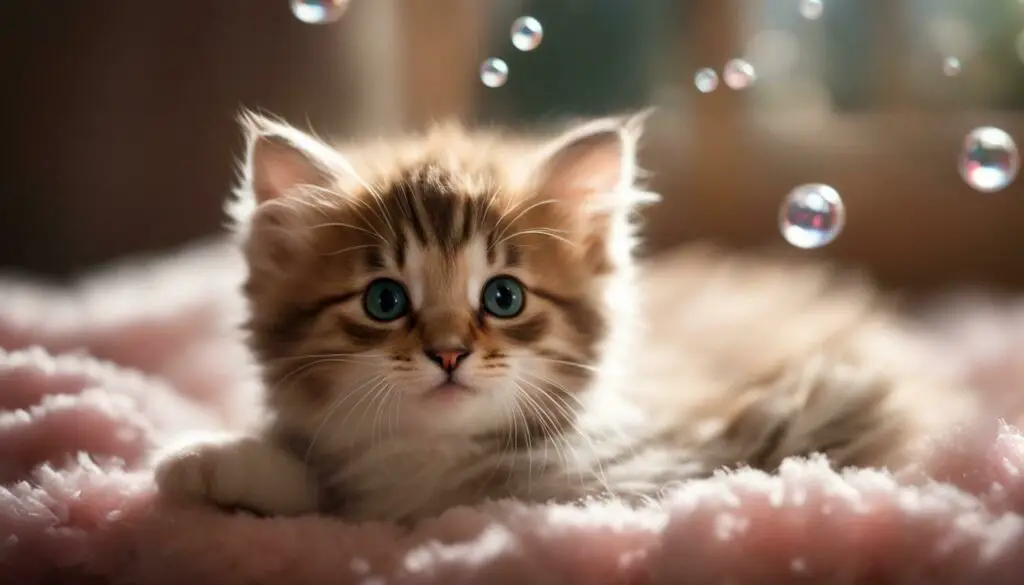
By understanding the common causes of kitten farting and taking appropriate measures, you can help keep your furry friend happy, healthy, and tooting less frequently.
Dietary Factors and Kitten Farting
The type of food your kitten consumes can have a direct impact on their tendency to fart. Certain ingredients in their diet can lead to increased flatulence. To ensure your kitten’s digestive health, it is important to provide them with a balanced and appropriate diet.
One common cause of excessive farting in kittens is lactose intolerance. Just like humans, some kittens are unable to digest lactose, the sugar found in milk. Feeding your kitten milk or other dairy products can result in digestive issues, including excessive farting. It is best to avoid feeding lactose-containing items to your kitten to prevent discomfort.
“The type of food your kitten consumes can have a direct impact on their tendency to fart.”
In addition to lactose, certain high-fiber foods can also contribute to increased flatulence. These include beans, lentils, and certain vegetables like broccoli and cabbage. While these foods are generally healthy for kittens, they can cause gas production in their digestive system. It is recommended to feed these foods in moderation or consult with a veterinarian for alternative options.
To help reduce farting in kittens, it is important to administer regular intestinal parasite preventatives. These medications can help eliminate any parasites that may be contributing to excessive gas production. Consult with your veterinarian to determine the appropriate preventative treatment for your kitten.
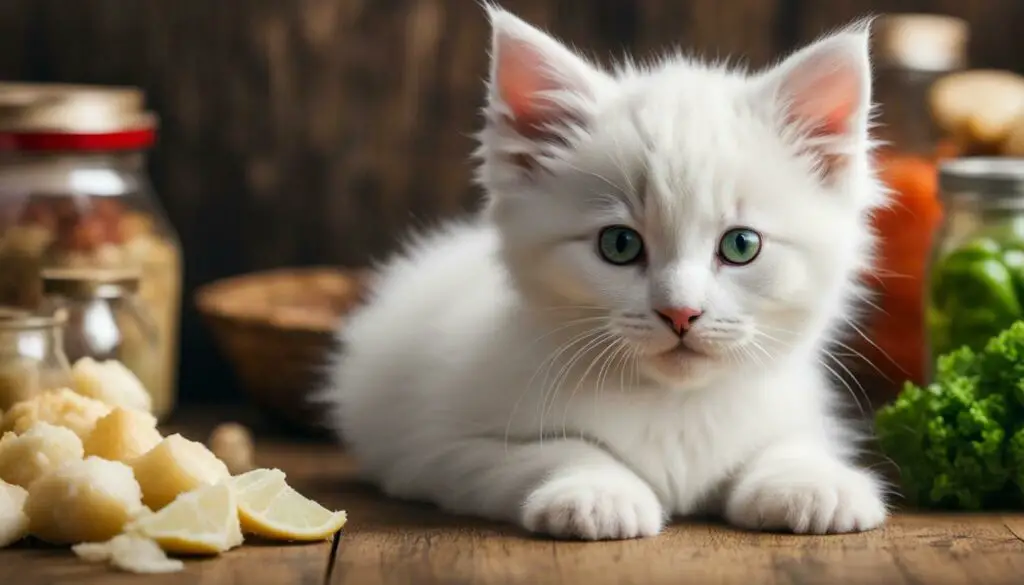
| Gas-Producing Foods to Avoid | Gas-Reducing Alternatives |
|---|---|
| Beans | Lean meats like chicken or turkey |
| Lentils | Grains like rice or quinoa |
| Broccoli | Leafy greens like spinach or kale |
| Cabbage | Root vegetables like carrots or sweet potatoes |
Summary
Diet plays a crucial role in determining a kitten’s farting tendencies. Avoid feeding lactose-containing items, such as milk, and be mindful of high-fiber foods that can contribute to excessive gas production. Regularly administering intestinal parasite preventatives can help eliminate parasites that may be causing farting. If you have concerns about your kitten’s diet and farting, consult with a veterinarian for personalized guidance and recommendations.
Identifying Food Allergies and Sensitivities
If your kitten’s farting is persistent, it might be worth considering if they have any food allergies or sensitivities. Just like humans, kittens can develop sensitivities to certain ingredients in their diet, leading to increased gas production. Common food allergens for kittens include dairy products, grains, and certain proteins like chicken or fish.
The best way to identify if your kitten has any food allergies or sensitivities is through an elimination diet. This involves removing suspected allergens from their diet and reintroducing them one by one to observe any adverse reactions. Keep a food diary and note any changes in their farting frequency or consistency during this process.
To help you get started on an elimination diet, here’s a sample table:
| Potential Allergen | Elimination Period | Observations |
|---|---|---|
| Dairy products (milk, cheese) | 2 weeks | No significant change in farting frequency |
| Grains (wheat, corn) | 2 weeks | Reduction in farting frequency |
| Chicken | 2 weeks | Increase in farting frequency |
Based on the observations, you can gradually reintroduce the suspected allergens one at a time to confirm if they indeed trigger excessive farting in your kitten. Remember to consult your veterinarian throughout the process for guidance and assistance.
Intestinal Parasites and Kitten Farting
Intestinal parasites are a common culprit behind excessive farting in kittens, and it’s essential to address this issue promptly. Parasites such as roundworms, hookworms, and tapeworms can cause gastrointestinal discomfort, leading to increased gas production. If your adorable kitten has been farting hilariously or you’ve seen a viral kitten fart video, it’s important to consider the possibility of intestinal parasites.
To eliminate these pesky parasites, your veterinarian will prescribe appropriate medications. Treatment can involve deworming medications that target specific parasites. It’s crucial to follow the recommended dosage and complete the full course of treatment to ensure effective parasite eradication. Remember, treating intestinal parasites not only reduces farting but also promotes your kitten’s overall health and well-being.
While addressing intestinal parasites, it’s essential to take preventive measures to avoid reinfestation. Regularly administering intestinal parasite preventatives, such as topical treatments or oral medications, can help protect your kitten from future infestations. These preventive measures are especially important if your kitten spends time outdoors or interacts with other animals.
Intestinal parasites are a common cause of excessive farting in kittens. Prompt treatment is necessary to alleviate discomfort and ensure your kitten’s well-being.
As responsible pet owners, we must also prioritize proper nutrition and hygiene when it comes to preventing and managing intestinal parasites. Feeding your adorable little furball a balanced diet that meets their nutritional needs is crucial. Avoid feeding them raw or undercooked meat, as it may contain parasites that can contribute to gastrointestinal issues, including excessive farting. Additionally, avoid giving your kitten lactose-containing items like milk, as kittens are typically lactose intolerant and consuming dairy products can lead to digestive upset.
| Prevention Tips: | Hygiene and Environment: |
|---|---|
|
|
Remember, if your adorable kitten is experiencing excessive farting, hilarious kitten farts, or you’ve come across a viral kitten fart video, it’s important to consult your veterinarian. They can provide a proper diagnosis and recommend the most appropriate treatment plan for your kitten’s individual needs.
Related: Kitten Farts: Laughable and Lovable
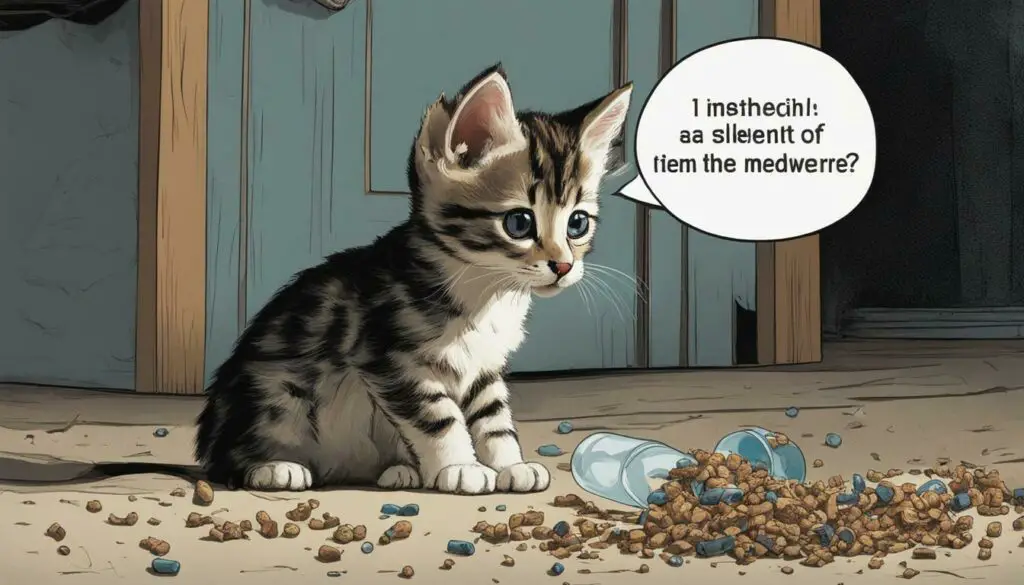
Addressing Intestinal Parasites
If your kitten is diagnosed with intestinal parasites, your veterinarian will prescribe medication to eliminate them. It’s important to follow the prescribed treatment regimen to ensure the complete eradication of parasites. Parasite infestation can cause discomfort and contribute to excessive farting in kittens, so it’s crucial to address this issue promptly.
While medication is the primary method of treatment, there are steps you can take to prevent future infestations. Regularly administering intestinal parasite preventatives recommended by your veterinarian can help protect your kitten from these unwanted guests. These preventatives come in various forms, such as topical treatments or oral medications, and they are designed to kill and prevent the reinfestation of parasites.
Additionally, maintaining good hygiene practices can minimize the risk of intestinal parasites for your kitten. Regularly cleaning your kitten’s litter box, washing their bedding, and keeping their living area clean can help prevent the spread of parasites and reduce the chances of reinfestation.
| Prevention Tips: |
|---|
| Administer regular intestinal parasite preventatives |
| Clean your kitten’s litter box regularly |
| Wash your kitten’s bedding frequently |
| Maintain a clean living environment for your kitten |
“Regularly administering intestinal parasite preventatives recommended by your veterinarian can help protect your kitten from these unwanted guests.”
Remember, if you notice any symptoms of intestinal parasites in your kitten, such as diarrhea, weight loss, or a bloated abdomen, you should consult your veterinarian for a proper diagnosis. Early detection and treatment are crucial to ensure your kitten’s well-being. By addressing intestinal parasites, you can help reduce excessive farting and improve your kitten’s overall health.
Image:
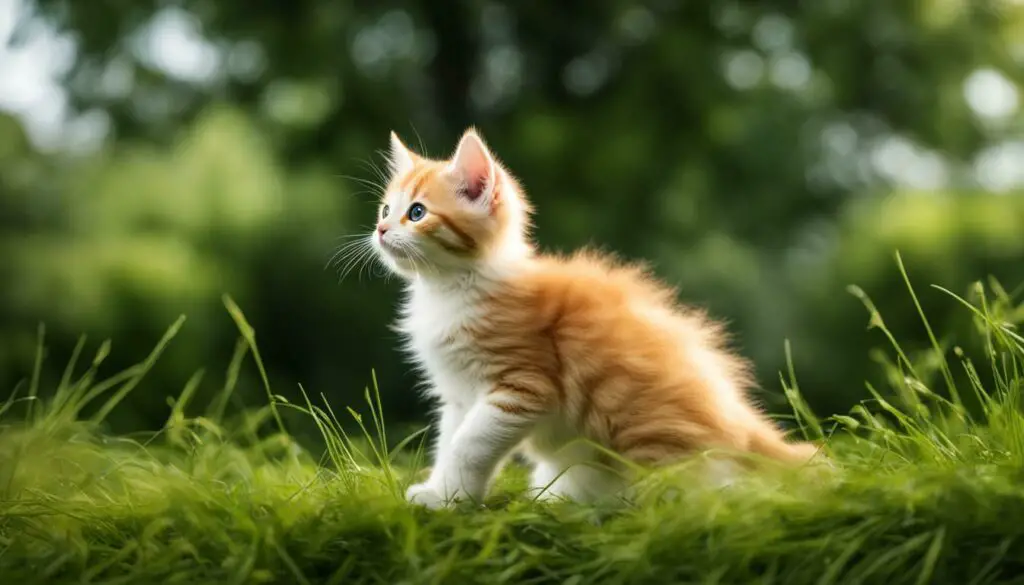
I hope this section has provided you with valuable information on addressing intestinal parasites and how they can contribute to excessive farting in kittens. In the next section, we will explore the role of intestinal diseases in causing farting and discuss potential treatments. Stay tuned!
Intestinal Diseases and Kitten Farting
In certain cases, underlying intestinal diseases can lead to persistent farting in kittens. These diseases can range from mild inflammation to more serious conditions like irritable bowel syndrome or inflammatory bowel disease. It’s important to recognize the signs and seek veterinary assistance for an accurate diagnosis and appropriate treatment.
Intestinal diseases in kittens can cause excessive gas production and contribute to frequent farting. Symptoms may include diarrhea, vomiting, weight loss, and changes in appetite. If you notice any of these signs in your kitten, it’s crucial to consult a veterinarian for a thorough examination.

The specific treatment for intestinal diseases in kittens will depend on the underlying condition and its severity. Medication may be prescribed to manage inflammation, regulate bowel movements, or address potential infections. In more severe cases, surgery may be necessary to remove obstructions or damaged parts of the intestines.
Additionally, veterinarians may recommend special dietary plans to ease symptoms and support your kitten’s digestive health. These diets are designed to be easily digestible, reduce inflammation, and provide necessary nutrients. It’s important to follow the recommended diet strictly and avoid feeding your kitten any lactose-containing items like milk, as lactose can aggravate digestive issues.
| Intestinal Diseases and Kitten Farting | Treatment |
|---|---|
| Irritable Bowel Syndrome | Medication, special diet |
| Inflammatory Bowel Disease | Medication, special diet, possible surgery |
| Intestinal Obstruction | Surgery |
| Intestinal Parasites | Medication |
Regular veterinary check-ups are essential for monitoring your kitten’s overall health and preventing potential complications. Your veterinarian can provide guidance on appropriate intestinal parasite preventatives and recommend a suitable vaccination schedule to keep your furry friend happy and healthy.
Seeking Veterinary Help
If you are concerned about your kitten’s excessive farting, seeking professional veterinary help is crucial for their well-being. Veterinary intervention can help determine the underlying causes of your kitten’s flatulence and provide the necessary treatment or guidance to address the issue.
When you visit your veterinarian, they will conduct a thorough examination of your kitten, including their diet, eating habits, and overall health. They may ask questions about the frequency and odor of the farts, any changes in your kitten’s behavior or appetite, and any other symptoms they may be experiencing.
Based on the examination and the information provided, the veterinarian may recommend specific tests, such as stool analysis or blood work, to rule out any underlying health conditions or identify potential parasites. These tests will help determine the most appropriate course of action to alleviate your kitten’s farting problem.
Regular intestinal parasite preventatives
Intestinal parasites can be a common cause of excessive farting in kittens. To prevent parasite infestation, it is essential to administer regular intestinal parasite preventatives as prescribed by your veterinarian. These preventatives typically come in the form of tablets or topical treatments and help protect your kitten from various parasites, such as roundworms, hookworms, and tapeworms.
Remember to follow the recommended dosages and administration instructions provided by your veterinarian. Regular deworming and preventive measures can significantly reduce the chances of your kitten developing excessive farting due to parasites.
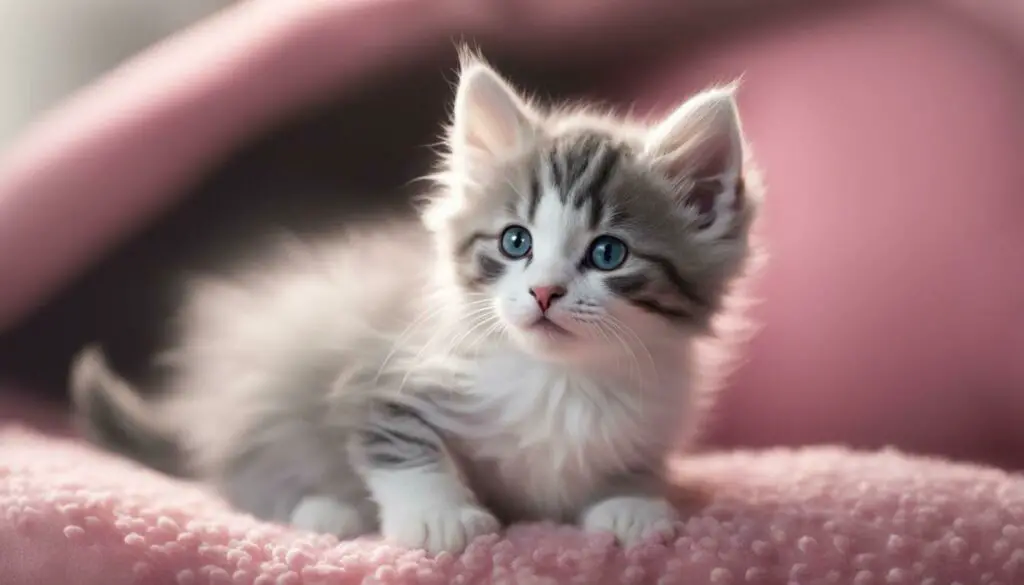
| Signs of Intestinal Parasites Include: | Treatment Options |
|---|---|
| Diarrhea | Medication prescribed by a veterinarian |
| Weight loss | Surgery (in severe cases) |
| Poor coat condition | Special diets |
| Abdominal pain |
Dietary Changes to Reduce Farting
If your veterinarian rules out any serious underlying causes, they may recommend dietary adjustments to minimize farting. Making appropriate changes to your kitten’s diet can help alleviate excessive gas production and reduce farting episodes. Here are some tips to consider:
- Avoid gas-producing foods: Certain foods are known to cause gas in kittens, such as beans, broccoli, cabbage, and dairy products. Avoid giving your kitten these foods to help reduce farting.
- Introduce a high-quality diet: Ensure that your kitten’s diet consists of high-quality, easily digestible cat food that contains essential nutrients. Opt for brands that prioritize digestive health.
- Consider a limited ingredient diet: If your kitten has food sensitivities or allergies, a limited ingredient diet may be beneficial. These diets typically have a simplified ingredient list, making it easier to identify potential triggers for farting.
- Slowly transition food: When introducing a new diet or switching to a different brand, do so gradually. Sudden changes in food can disrupt your kitten’s digestive system and lead to increased flatulence. Slowly mix in the new food with the old over the course of several days.
Remember to consult with your veterinarian before making any significant changes to your kitten’s diet. They can provide personalized recommendations based on your kitten’s specific needs and health condition.
| Kitten Farting Myths | Fact |
|---|---|
| Feeding milk to kittens reduces farting. | False |
| Kittens only fart when they are full. | False |
| Kittens will outgrow farting as they get older. | False |
| Kitten farts are always odorless. | False |
It’s important to note that occasional farting is normal in kittens, just as it is in adult cats. However, if your kitten’s farting is frequent, persistent, or accompanied by other concerning symptoms, it’s best to seek veterinary advice for proper diagnosis and treatment.
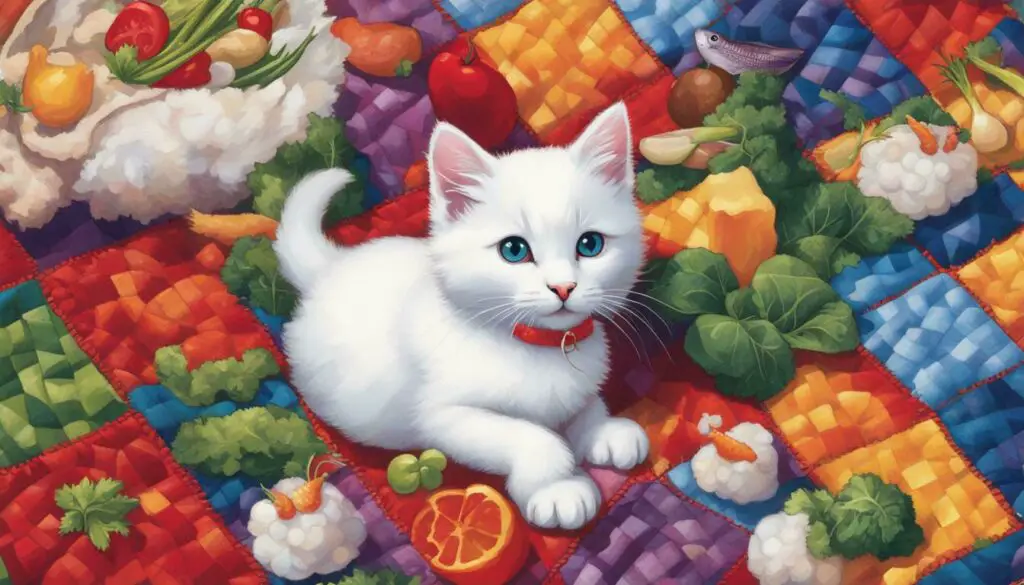
Avoiding Gas-Producing Foods
Certain food items are known to cause excessive gas in kittens, and avoiding them can help alleviate the farting issue. It is important to be aware of these foods and make appropriate dietary changes to reduce your kitten’s farting episodes. Some common gas-producing foods that you should avoid feeding your kitten include:
- Beans
- Cabbage
- Onions
- Broccoli
- Brussels sprouts
- Cauliflower
- Dairy products
- Processed foods
By eliminating or reducing the consumption of these foods in your kitten’s diet, you can significantly reduce their farting episodes. It’s important to note that every kitten is different, and certain foods may affect them more than others. Therefore, it’s essential to observe your kitten’s reactions and adjust their diet accordingly.
In addition to avoiding gas-producing foods, it’s advisable to avoid feeding lactose-containing items like milk. Many kittens are lactose intolerant, and consuming dairy products can cause gastrointestinal discomfort and increased flatulence. Opt for lactose-free alternatives or consult your veterinarian for suitable milk substitutes for your kitten.
Remember to administer regular intestinal parasite preventatives as recommended by your veterinarian. Parasites can also contribute to excessive gas production in kittens. By following these dietary guidelines and maintaining good overall health, you can help your adorable kitten fart less and enjoy a happier, healthier life together.
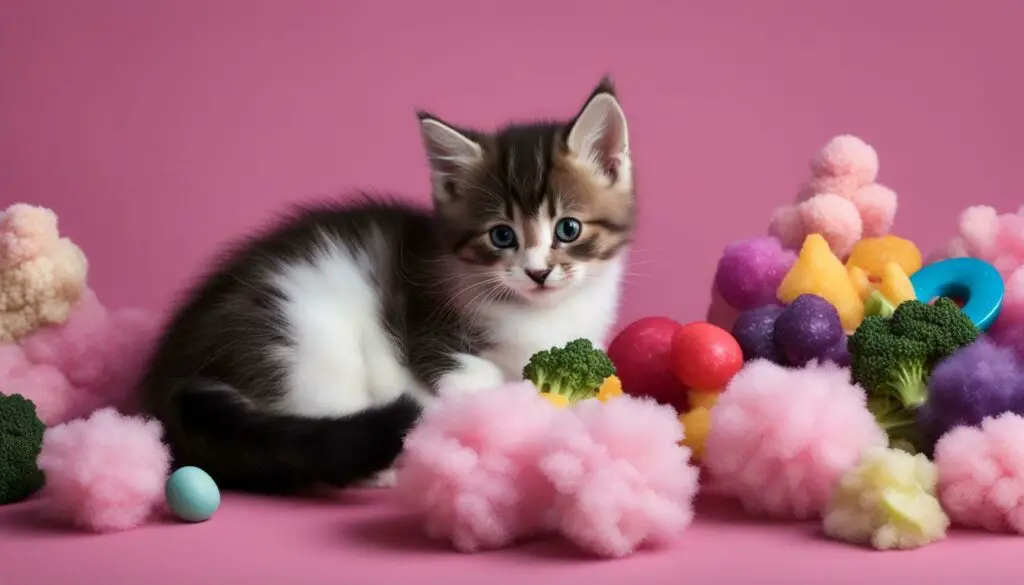
Monitoring Diet and Feeding Habits
By monitoring your kitten’s diet and feeding habits, you can gain insights into what might be causing their excessive farting. Keep a record of what your kitten eats and when they eat it. This will help you identify any potential triggers or patterns related to their farting episodes.
- Pay attention to the type and quality of food you are feeding your kitten. Some kittens may have sensitivities or allergies to certain ingredients, such as grains or dairy. Consider switching to a high-quality, grain-free, and age-specific cat food to see if it makes a difference.
- Avoid feeding your kitten lactose-containing items like milk. Many kittens are lactose intolerant, and consuming dairy products can cause digestive issues and excessive gas production.
- Ensure your kitten is getting the appropriate amount of food for their age and size. Overfeeding can lead to indigestion and increased flatulence. Refer to the feeding guidelines provided by the cat food manufacturer or consult your veterinarian for guidance.
Additionally, administering regular intestinal parasite preventatives is crucial for maintaining your kitten’s digestive health. Intestinal parasites can contribute to excessive farting, so consult your veterinarian for the recommended preventative measures.
Remember, every kitten is unique, and what works for one may not work for another. If you’ve made necessary dietary changes and monitored their feeding habits closely, but your kitten’s excessive farting continues, it’s important to seek veterinary help. A veterinarian will be able to assess your kitten’s overall health, conduct further tests if needed, and provide appropriate treatment to address the underlying cause of the excessive farting.
| Feedings per day | Age (in months) | Amount per feeding |
|---|---|---|
| 4 | 2-3 | 1/4 – 1/3 cup |
| 3 | 4-5 | 1/3 – 1/2 cup |
| 2 | 6-8 | 1/2 – 2/3 cup |
Key Takeaways:
- Monitoring your kitten’s diet and feeding habits can help identify potential causes of excessive farting.
- Consider switching to a high-quality, grain-free, and age-specific cat food to address any dietary sensitivities.
- Avoid feeding lactose-containing items like milk to prevent digestive issues.
- Ensure your kitten is getting the appropriate amount of food for their age and size.
- Administer regular intestinal parasite preventatives as recommended by your veterinarian.
- If excessive farting persists despite dietary changes, consult a veterinarian for proper diagnosis and treatment.
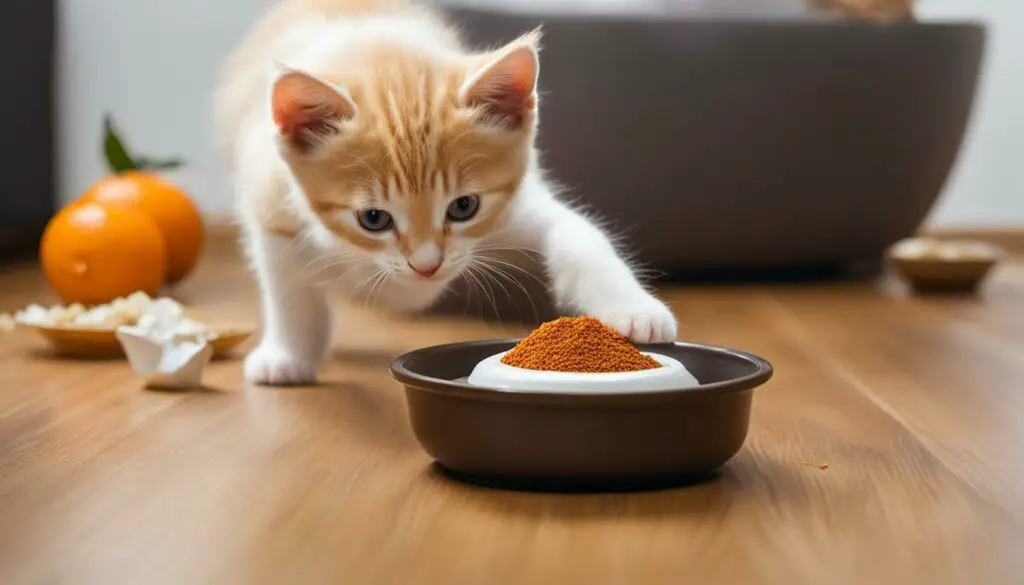
Intestinal Diseases Treatment
In cases of intestinal diseases, your veterinarian will recommend appropriate treatment options to address the underlying issue. Treatment methods may vary depending on the specific disease and its severity. Medication is often prescribed to manage symptoms and promote healing. Surgery may be necessary in more severe cases to remove obstructions, tumors, or damaged sections of the intestines.
Some kittens with intestinal diseases may require a special diet to alleviate symptoms and support their digestive system. These diets are typically formulated to be easily digestible and may contain specific ingredients to reduce inflammation and promote intestinal health. Your vet will provide guidance on which food choices are best suited for your kitten’s needs.
It is important to closely follow your veterinarian’s instructions for administering medication and implementing dietary changes. Regular monitoring and follow-up appointments will be necessary to assess your kitten’s progress and make any necessary adjustments to their treatment plan.
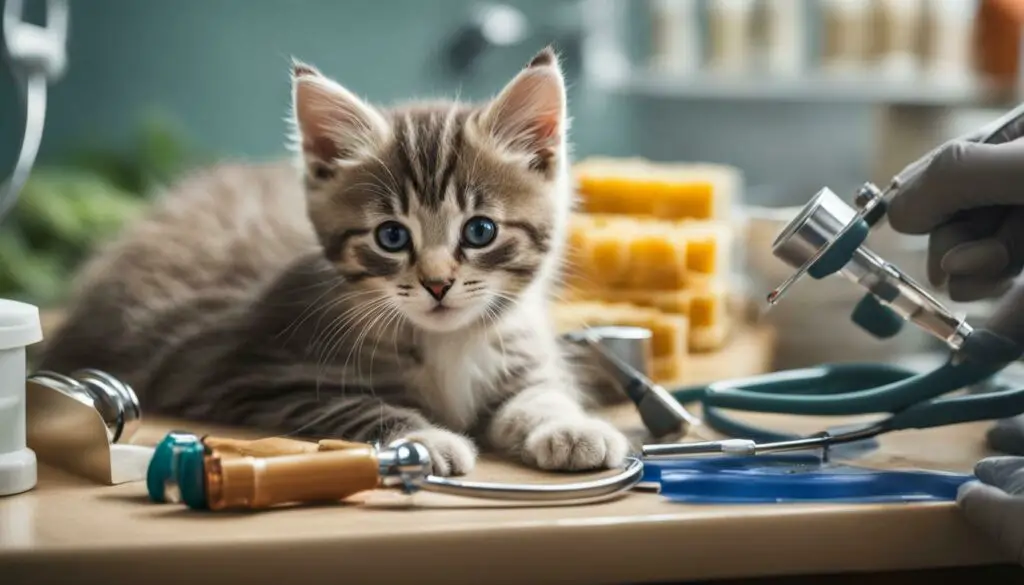
In addition to medication and dietary modifications, it is essential to take preventive measures to reduce the risk of intestinal diseases in kittens. Always provide a balanced diet that meets their nutritional needs and avoid feeding them foods that may cause digestive upset. Lactose-containing items such as milk should be avoided as kittens lack the necessary enzymes to properly digest lactose. Regularly administer intestinal parasite preventatives as recommended by your veterinarian to minimize the risk of infestation.
Summary:
Intestinal diseases in kittens require appropriate treatment options, which may include medication, surgery, and special diets. Regular monitoring and follow-up appointments are necessary to assess the progress and make any necessary adjustments to the treatment plan. Preventive measures, such as providing a balanced diet, avoiding lactose-containing items, and administering regular intestinal parasite preventatives, can help minimize the risk of intestinal diseases in kittens.
| Treatment Options | Description |
|---|---|
| Medication | Prescribed to manage symptoms and promote healing |
| Surgery | Necessary in severe cases to remove obstructions, tumors, or damaged sections of the intestines |
| Special Diets | Formulated to be easily digestible and contain specific ingredients to reduce inflammation and promote intestinal health |
Remember: Always consult with a veterinarian for proper diagnosis and treatment of intestinal diseases in kittens. They are the best resource to ensure your kitten’s health and well-being.
Conclusion
If your adorable kitten is farting excessively, remember to consult a veterinarian for a proper diagnosis and to explore the most suitable solutions. Excessive farting in kittens can be caused by various factors, including dietary issues, intestinal parasites, and intestinal diseases. It’s essential to seek professional guidance to determine the underlying cause and develop an appropriate treatment plan.
Intestinal parasites, a common cause of flatulence in kittens, can be effectively eradicated with the use of medications prescribed by a veterinarian. Additionally, making dietary changes can help reduce farting episodes. Avoiding gas-producing foods and monitoring your kitten’s diet and feeding habits can make a significant difference in alleviating excessive farting.
In some cases, kittens may experience intestinal diseases that contribute to excessive farting. Treatment options for these conditions may include medications, surgery, or special diets, depending on the specific diagnosis. It is crucial to follow the veterinarian’s recommendations and closely monitor your kitten’s progress throughout the treatment process.
Furthermore, it’s important to remember that certain foods, such as lactose-containing items like milk, can trigger excessive farting in kittens. Therefore, it is advisable to avoid feeding these items to your furry friend. Additionally, administering regular intestinal parasite preventatives can help prevent future episodes of farting caused by parasites.
By seeking veterinary help, implementing dietary changes, and carefully monitoring your kitten’s health, you can address and manage excessive farting. Remember, each kitten is unique, and the appropriate solution may vary. Your veterinarian will guide you in finding the most suitable approach for your adorable furry companion.
FAQ
What causes excessive farting in kittens?
Excessive farting in kittens can be caused by various factors, including dietary issues, intestinal parasites, and intestinal diseases.
When should I consult a veterinarian about my kitten’s farting?
If your kitten is farting excessively and it is persistent, it is important to consult a veterinarian for proper diagnosis and treatment.
How can intestinal parasites be treated in kittens?
Intestinal parasites can be treated with appropriate medications prescribed by a veterinarian.
Can dietary changes help reduce farting in kittens?
Yes, making appropriate dietary changes, such as avoiding gas-producing foods, may help reduce farting in kittens.
What should I avoid feeding my kitten to prevent farting?
It is important to avoid feeding lactose-containing items like milk, as well as identify and avoid gas-producing foods.
How can I monitor my kitten’s diet and feeding habits?
Keeping track of your kitten’s diet and feeding habits is essential to identify any potential triggers for their farting.
What are the treatment options for intestinal diseases in kittens?
Treatment options for intestinal diseases in kittens may include medication, surgery, or special diets, depending on the specific condition.
Source Links
- https://www.thesprucepets.com/why-do-cats-fart-554763
- https://cats.com/do-cats-fart
- https://www.hillspet.com/cat-care/healthcare/do-cats-fart

